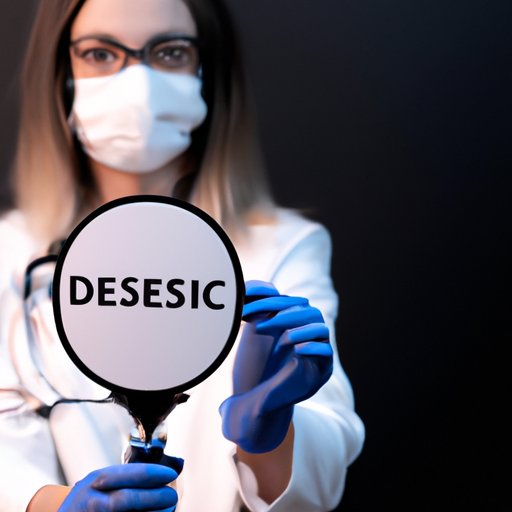
I. Introduction
Infectious disease is a medical field that deals with the diagnosis, treatment, and prevention of infectious diseases caused by viruses, bacteria, fungi, or parasites. Infectious disease doctors play a crucial role in protecting public health by identifying and containing outbreaks of infectious diseases. In this article, we will explore what infectious disease doctors do, their role in the healthcare system, and how they work to keep communities safe from disease outbreaks.
II. Exploring the Role of Infectious Disease Doctors: From Diagnosis to Treatment
Infectious disease doctors are medical specialists who have expertise in diagnosing and treating a wide range of infectious diseases. They have extensive knowledge about how infections are spread, the symptoms presented by different diseases, and the appropriate treatment options to be used.
Infectious disease doctors treat a variety of diseases from common illnesses like the flu to more severe infections such as HIV, tuberculosis, and meningitis. They can also diagnose and treat emerging infections such as the coronavirus.
To diagnose infections, infectious disease doctors use a variety of methods such as blood tests, cultures, and imaging tests. Treatment options vary depending on the disease and its severity. Common treatments include antiviral or antibiotic medications, supportive care, and hospitalization.
The diagnosis and treatment of infectious diseases are critical to preventing the spread of disease. Proper diagnosis ensures that the right treatment is given, ensuring that the patient recovers faster and reducing the risk of infection spreading to others.
III. Inside the Life of an Infectious Disease Doctor: A Comprehensive Look
Infectious disease doctors have a challenging job that involves managing complex medical cases, working to contain outbreaks, and collaborating with other healthcare professionals. A typical day for an infectious disease doctor involves hospital rounds, attending meetings, conducting research, and seeing patients with various infectious diseases.
Becoming an infectious disease doctor requires specific education and training. After completing medical school, they undergo a residency in internal medicine or pediatrics followed by a fellowship in infectious disease. These fellowships last for two to three years, during which doctors gain clinical experience and conduct research in infectious diseases.
Infectious disease doctors face several challenges in their work. These include emerging infectious diseases, the evolution of antibiotic resistance, and the difficulty of containing diseases in a globalized world. Despite these challenges, infectious disease doctors work tirelessly to keep patients healthy and prevent the spread of disease.
Collaboration with other healthcare professionals such as epidemiologists, nurses, and laboratory technicians is essential in providing comprehensive care to patients. This collaboration ensures that each patient receives appropriate care and that disease outbreaks are accurately contained and prevented from spreading.
IV. The Importance of Infectious Disease Doctors: Protecting Communities from Outbreaks
Infectious disease doctors play a vital role in preventing and containing outbreaks of infectious diseases. Their expertise and knowledge help public health officials to track and contain diseases such as tuberculosis, measles, and coronavirus. Through vaccination programs and public health education, infectious disease doctors work to prevent the spread of infectious diseases.
Infectious disease doctors also collaborate with public health officials to track and manage outbreaks. They help in identifying the source of outbreaks, managing patients, and working to contain the spread of disease. By containing the spread of disease, infectious disease doctors help to protect communities from severe health and socio-economic impacts.
Vaccinations are an essential component of public health initiatives in preventing outbreaks. Infectious disease doctors play a vital role in developing and administering vaccination programs and encouraging public adoption of vaccines. Through vaccination programs, infectious disease doctors can prevent the occurrence of diseases such as polio, measles, and influenza.
V. From HIV to COVID-19: How Infectious Disease Doctors Fight for Public Health
Infectious disease doctors have been at the forefront of combating significant infectious disease outbreaks such as HIV/AIDS and COVID-19. In the early 1980s, infectious disease doctors identified the first cases of HIV/AIDS, a virus that has infected over 70 million people worldwide. Through medical research and patient care, infectious disease doctors have developed antiviral medication that helps HIV positive individuals have a longer, healthier life.
The recent COVID-19 pandemic has highlighted the critical role of infectious disease doctors in responding to infectious disease outbreaks. Infectious disease doctors have worked to contain the spread of COVID-19 through developing treatment options and vaccines. They also provide public education on precautions to take to avoid contracting the virus.
Research is critical to advancing the diagnosis, treatment, and prevention of infectious diseases. Infectious disease doctors are heavily involved in medical research aimed at developing new treatments and vaccines for various infectious diseases. Research has led to significant advances in infectious disease care, including the development of drugs that manage chronic viral diseases such as HIV.
VI. Behind the Scenes of Infectious Disease: A Doctor’s Journey to Combatting Deadly Illnesses
Infectious disease doctors have to face daily the difficult task of managing patients with infectious diseases, some of which have no cure. This work can be physically and emotionally challenging and takes a toll on their daily lives.
Despite the challenges, infectious disease doctors have the opportunity to help patients recover from life-threatening illnesses. Through their work, they gain a personal sense of purpose and satisfaction from seeing their patients overcomes significant obstacles.
Infectious disease doctors have strong patient-doctor relationships that stem from their shared experiences. These relationships strengthen their resolve to end and prevent the spread of infectious diseases.
VII. Conclusion
Infectious disease doctors are essential medical experts in the prevention, diagnosis, and treatment of infectious diseases. Through collaboration with other healthcare professionals, infectious disease doctors work tirelessly in providing comprehensive care to patients. They also play a critical role in public health initiatives aimed at preventing the spread of infectious diseases. The work of infectious disease doctors is vital in protecting the health of individuals and communities worldwide.
As such, ongoing support for medical research and public health initiatives is critical in advancing the diagnosis, treatment, and prevention of infectious diseases.




